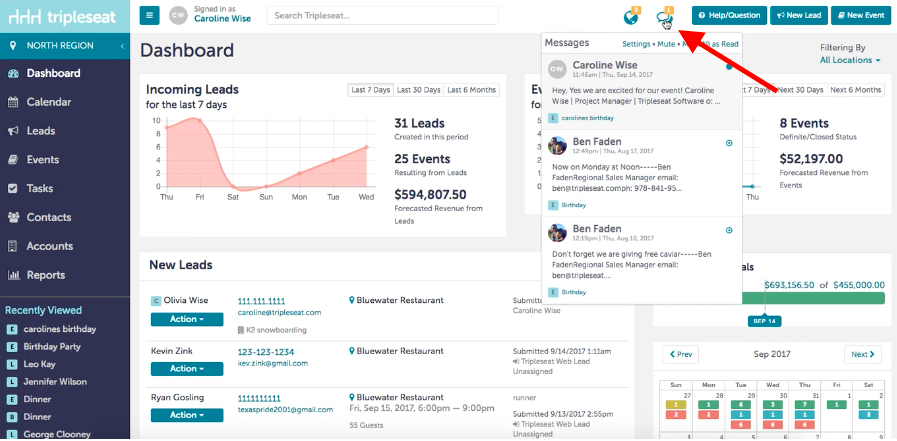Event Team Organization: Tips for Building a Winning Team at Your Venue

For restaurants, hotels, and unique venues offering event services, event team organization is essential to ensuring success—whether you run a team that puts on tons of casual intimate gatherings or hosts more formal large-scale celebrations. Hosting events of all kinds requires seamless collaboration and a cohesive team effort to deliver an exceptional guest experience. Here’s how to build an event team that can help your venue execute any event flawlessly.
Why Organize a Strong Event Team?
An organized event team not only helps things run smoothly but can also improve attendee experiences in key ways:
Creates Efficient Problem Solving
No matter how well an event is planned and managed, unexpected issues arise. Having a team with expertise and experience allows for quick problem-solving, ensuring minimal disruptions.
Event Team Organization Reduces Stress
Event planning is demanding, often with long hours, but sharing responsibilities helps alleviate the pressure and maintain a positive atmosphere.
Fosters Knowledge Sharing and Learning
Working in a team promotes skill-sharing. No one person can be an expert in all areas, so having specialists ensures high-quality results across every aspect of the event.
Supports Unique and Memorable Events
Team collaboration brings diverse ideas, making each event distinct and memorable for attendees.
Encourages Faster Management Execution
With each member handling specific tasks and deadlines, events can be managed more quickly and efficiently.

How Should You Structure an Event Team?
For restaurants, hotels, and unique venues, structuring an event team requires clear role definitions and a strategic approach to match the specific needs of their business model. Here’s a step-by-step guide on how these venues can set up an effective event team to ensure each event runs seamlessly.
1. Define Core Event Roles Based on Event Type and Size
Small Events
For smaller events like private dining or small receptions, the team can be lean. Key roles include an Event Manager to handle logistics and client communication, a Captain to manage day-of operations, and Kitchen and Service Staff for execution.
Large Events
For weddings, conferences, or large gatherings, a more comprehensive team is needed, often with additional roles such as an Event Sales Coordinator to handle bookings, a Banquet Team for service, and Operations Staff for setup and breakdown.
2. Establish Key Roles and Responsibilities
To organize a successful event, it’s essential to define clear roles. Depending on your business, you may have some or all of these event roles on your team.
Event Manager / Lead / Coordinator
- Coordinates client vision with setup, team organization, and administrative tasks to ensure smooth event execution.
Event Sales Associate / Coordinator
- Manages event leads and inquiries, works with clients, and collaborates with marketing to meet sales goals.
Event Captain
- Oversees event staff, addresses guest needs, and ensures compliance with safety and service standards.
Event Kitchen Staff
- Prepares event menu items while following food safety guidelines and coordinating with front-of-house staff.
Event Banquet Staff and Event Servers
- Welcomes and serves guests, maintaining cleanliness and coordinating with kitchen and event leaders.
Check out this Event Staff Hiring guide to building a balanced and effective event team.
3. Adapt Team Structure to Reflect Event Seasonality
To effectively manage fluctuating demand, venues should adapt their team structure by hiring flexible, seasonal staff for peak times and cross-training permanent staff during slower seasons to ensure full coverage and maintain service quality year-round.
Cross-Training
During off-peak times, cross-train team members on different roles, which can improve adaptability and cover any gaps during busy events.
Flexible Staffing
For venues with peak seasons, consider hiring part-time or on-call event staff to maintain service quality without overstaffing during slower periods.
5 Tips for Building a Efficient Event Team
Here’s a streamlined approach to build a high-performing event team:
1. Define Event Goals
Why: Each event has unique objectives, whether it’s to foster networking, provide a memorable dining experience, or showcase a new product. Clarifying these goals helps shape a more purposeful team structure.
How: Meet with clients or event planners to outline key objectives (KPIs), then determine which departments or roles are critical to support these aims. Set measurable goals for team members to keep them motivated and focused on growth.
2. Assess Tasks and Needs for Automation and Technology

Why: Not all tasks require hands-on management; identifying where manpower is most valuable versus where automation can be leveraged optimizes efficiency.
How: Break down event tasks, from guest check-ins to food prep, and determine which require a dedicated team presence and which can be streamlined using technology. With automated task tracking, you can assign team members specific responsibilities, ensuring nothing slips through the cracks. Use tools like Tripleseat to simplify registration, communication, and task management.
3. Hire Skilled and Organized Event Professionals
Why: Hiring individuals with experience relevant to their roles ensures that each aspect of the event is handled professionally, creating a seamless experience for guests.
How: Look for team members who have proven expertise in their assigned responsibilities, whether it’s front-of-house service, logistics, or vendor coordination.
4. Communicate a Unified Vision for an Organized Event Team
Why: Communication is critical to team success. When the entire team shares a clear understanding of the event’s purpose and goals, they are more likely to work together harmoniously and anticipate needs.
How: Host a team meeting to communicate the event’s goals, expectations, and each person’s role. Encourage questions to clarify responsibilities and ensure alignment. Also, set up weekly or daily emails, summarizing event updates for your team.
For both large and small teams, digital tools can keep everyone on the same page. Automated event management tools, like Tripleseat, can also streamline tasks across teams, helping you manage resources efficiently without sacrificing quality. Notify your team of updates to ensure everyone’s in the loop on changes. Tripleseat can be accessed anywhere, anytime that allows team members to access information on the go, keeping them updated even during on-site events.
5. Provide Event Team Feedback to Improved Organization
Why: Constructive feedback supports continuous improvement, helping each team member refine their skills and contribute more effectively to future events.
How: After each event, conduct brief evaluations to assess team performance. Acknowledge successes, discuss any challenges, and provide actionable feedback to foster growth, boost morale, and inspire others.
Teams Using Tripleseat are Organized Teams
With a well-organized team, streamlined tools, and a clear game plan, you’re ready to host events that impress attendees and clients alike. For more on how Tripleseat’s features can help you keep your team organized, schedule a demo and take your event planning to the next level!
